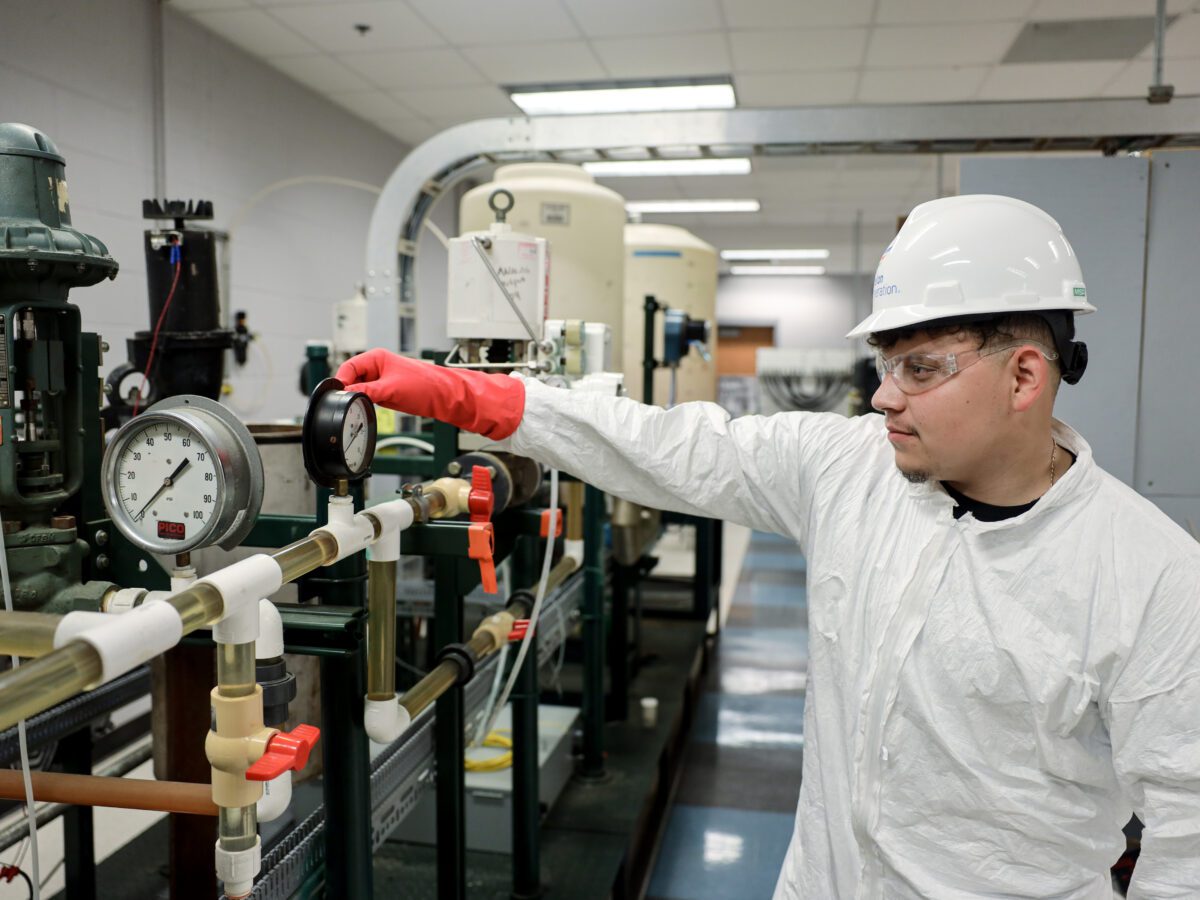
This year marks the 20th anniversary of the Cape Fear Community College (CFCC) associate degree in nuclear technology. With the terms climate change, decarbonization, and clean energy becoming commonplace, providing quality education for those pursuing careers in clean nuclear energy is more important than ever.
In 2003, CFCC and GE Hitachi Nuclear Energy (GEH) founded a nuclear technology program. The two organizations collaborated to develop a curriculum to provide quality training for the next generation of nuclear reactor technicians. In 2008, the program enrolled its first students.
CFCC’s nuclear technology associate degree program prepares students to become reactor field technicians qualified to work in licensed nuclear reactor facilities. The program includes a work-based learning component, allowing students to learn first-hand in a real-world setting.
Since the 1960s, GEH has supplied nuclear-boiling water reactors for power generators. In the early 2000s, GEH relocated its boiling water reactor design and service team to its facility in Wilmington. Today, GEH has over 2,000 employees and is at the forefront of designing and manufacturing small modular reactors using boiling water technology for power generation. In addition, an agreement with TerraPower puts GEH in a position to help provide the power market with an advanced nuclear reactor product.
GEH specialists teach specific courses within the program. Their instruction allows students to learn from seasoned professionals in the industry. One of those GEH specialists was John Zino, chief consulting engineer for advanced plant technology.
“It has been an absolute pleasure for me to support the CFCC nuclear technology program over the past eight years as a part-time instructor,” said Zino. “The experience has allowed me to work with some very talented and motivated aspiring young nuclear professionals in their pursuit to gain the foundational technical knowledge needed to contribute not only to the success of GEH but also to the success of the entire nuclear industry.”
With 20 years of nuclear technology education, this signals a success story for Cape Fear. Taylor King, who graduated from the program in 2018, currently works for GEH in their technical services department. Taylor’s experience is emblematic of this partnership.
“Cape Fear Community College provided me with an education and a launchpad for success,” King said. “The nuclear technology program equipped me with the skills and knowledge to become a proficient nuclear technician. I am grateful for the opportunities CFCC afforded me and the instructors who cared deeply about my success and growth. Their guidance and support were instrumental in shaping my journey to success.”
A 2011 program graduate, Clayton Harding attributed his successful career to CFCC. “My nuclear maintenance degree offered me a direct path to a career as a contractor supporting GE field services. I have now spent 13 years supporting GE, moving from reactor service technician to project manager. I now train the new students from the program, lead projects in the field, and support the program as an advisory committee member.”
CFCC’s course offerings continue to bring value to the nuclear technology program. The current program instructor, Lindsay Kaldon, brings her nuclear engineering expertise as NASA’s fission surface power project manager to the classroom.
“One of the biggest challenges we face within the nuclear industry, both with space and terrestrial systems, is how do we bring on the next generation of technicians and engineers to build our nation’s nuclear workforce?” Kaldon said.
“I’m excited to be part of a well-structured curriculum that offers the training to succeed in the nuclear field. Not only are CFCC students able to get a quality education, but they are provided with the resources needed to enter the workplace as soundly trained nuclear technicians immediately, and any students continue their educations after CFCC, going on to earn bachelor’s degrees in nuclear engineering from schools like North Carolina State University. This is an exciting time in the country with advancements every day in reactor systems, and CFCC is a great option for anyone looking to be part of that.”
CFCC continues to advance the program, extending its existing partnership with North Carolina State University. In 1950, NC State founded the first university-based reactor program and nuclear engineering curriculum in the United States. Today, the program is home to the only PULSTAR reactor still in operation. The reactor provides students with hands-on training and real-world experience. The partnership between our two institutions allows CFCC nuclear technology students to visit and utilize the PULSTAR reactor, as well as sample fuel rods and dosimetry.
Another part of the relationship with NC State includes access to their advanced nuclear technology/small modular nuclear reactor libraries collection. This resource gives the reader a better understanding of the latest nuclear energy technologies, including those that GEH offers the marketplace.
CFCC’s partnership with GEH to educate future reactor field technicians extends beyond the classroom. In 2015, GEH created the nuclear maintenance technician scholarship to support students in the nuclear technology program. This annual scholarship of $3,000 is open to any nuclear technology student with at least a 3.0 GPA and who attends CFCC full-time.
To further celebrate the 20th anniversary of the nuclear technology program, CFCC has partnered with Sonic Systems, a leading provider of nuclear support worldwide, to provide well-paying employment opportunities for students. Sonic Systems will hire students at $26 per hour and offer a clear path of advancement with GEH. Go here to learn more about the nuclear technology association degree program.


